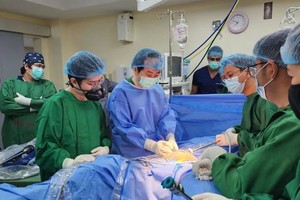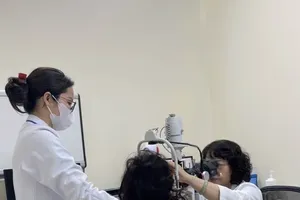The Ho Chi Minh City Department of Health predicts a rise in the number of hand, foot, and mouth disease (HFMD) cases, including severe ones, in the coming weeks. Approximately 80 percent of the hospital admissions and severe cases are anticipated to originate from other provinces and cities and will be transferred to HCMC.
The HCMC Department of Health has recently issued a report to the Ministry of Health regarding the current situation of HFMD in the city. In particular, there is a notable surge in the number of confirmed cases, resulting in an increase in severe cases being admitted to hospitals.
The availability of treatment drugs is not expected until the end of August 2023
According to the Department of Health, HCMC has reported a total of 7,823 cases of HFMD from the beginning of 2023 until July 14. Out of these, 2,370 cases required hospitalization for treatment, with 212 cases being severe, accounting for 8.95 percent. In June 2023 and the first two weeks of July 2023 alone, there were a total of 1,774 in-patient treatment cases, of which 371 cases were residents of HCMC, making up 20.9 percent, while the remaining cases were transferred from other provinces and cities to HCMC for treatment.
The HCMC Department of Health predicts a further increase in the number of HFMD cases, including severe ones, in the coming weeks. Approximately 80 percent of the hospital admissions and severe cases are anticipated to originate from other provinces and cities and will be transferred to HCMC for treatment. So far, there have been six reported fatalities in HCMC-based hospitals, with the victims registered as residents in other provinces and cities.
"Although there have been no reported fatalities from HFMD in HCMC, the presence of Enterovirus (EV71) as the causative agent - a highly pathogenic strain of the virus - raises concerns about the potential for severe disease progression and fatalities. In the past, EV71 was responsible for significant outbreaks in HCMC in 2011 and 2018," according to the HCMC Department of Health's report.
Currently, HCMC is facing the second scenario of the outbreak, with 50-100 new hospital admissions per day, 200-700 cases undergoing in-patient treatment, and 20-70 severe cases. The healthcare facilities are equipped with 700 regular beds and 80 intensive care unit (ICU) beds to manage the situation.
Experts have pointed out that the emergence of the EV71 variant and the limited availability of essential medications for HFMD treatment, such as Immunoglobulin (IVIG) and intravenous Phenobarbital, in Southern provinces, have contributed to the increasing number of cases being transferred from other provinces and cities to HCMC. This accounts for approximately 60- 80 percent of the cases. Among these cases, some exhibit rapid disease progression and critical conditions.
According to the HCMC Department of Health, despite preparations for the supply of drugs to treat HFMD, the expected reserve of medications may not be sufficient to cope with the rapidly evolving disease situation, particularly considering the ongoing influx of critically ill patients from other provinces.
In addition, it has been reported that the daily usage of IVIG has surged from 80 to 150 vials between July 7 and July 13, and it is now reaching approximately 200 vials per day since July 13, with no signs of slowing down. As of now, hospitals have around 2,400 vials of IVIG in stock, and it is projected that the next import of IVIG will not be available until the end of August 2023, with limited quantities expected.
Request for local hospitals to provide treatment support
According to the Department of Health's assessment, HCMC may encounter a shortage of IVIG medications starting from the end of July 2023 (if the number of severe cases remains at the current level) or potentially even earlier if the situation continues to worsen rapidly. The Department of Health will maintain close monitoring of the usage and availability of IVIG medications to evaluate the situation and propose additional intervention measures if necessary. They will also continue to receive updates from the supplying companies and closely report to the Drug Administration of Vietnam under the Ministry of Health.
In light of the potential shortage of IVIG medication, the HCMC Department of Health has issued directives to proactively utilize IVIG in the treatment of HFMD. Experts have agreed that patients categorized under the 2b group, severity levels 2, 3, or 4 of HFMD, are recommended to receive a single dose of IVIG. A second dose is prescribed in cases where the patient's condition worsens or the symptoms at severity level 3 show no signs of improvement.
The Ho Chi Minh City Department of Health recommends that the Ministry of Health designate last-line hospitals in provinces and cities with the capacity to admit and treat HFMD patients to receive and treat patients from neighboring areas. Specifically, they mention Ca Mau Children's Hospital, Can Tho Children's Hospital, and Dong Nai Children's Hospital. This initiative aims to ensure that severe cases receive immediate treatment and that the patient transfer process is safe and efficient.
Additionally, the HCMC Department of Health urges the Drug Administration of Vietnam to expedite the approval of any import orders for IVIG medications if they are available. They also suggest that the Ministry of Health takes immediate action to provide guidance and implement solutions to ensure a steady supply of HFMD treatment drugs to the Southern provinces.
























